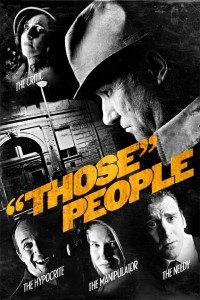
Those Manipulative People*
Sycamore Creek Church
August 5, 2012
Tom Arthur
Matthew 16:21-23
Peace Friends!
How many of you know someone who would try to control and manipulate you? Raise your hand. Now raise both hands. Just seeing if I’ve still got control over you.
So today we continue in a series called Those People. You know. Those people. The critical neighbor. The hypocritical boss. The needy family member. Well, today we’re looking at those manipulative people in your lives. Who manipulates you?
A guy dies and goes to heaven. When he gets there he sees that there are two lines going up to the pearly gates. The first line has hundreds and thousands of men standing in it. It is labeled, THOSE CONTROLLED BY THEIR WIVES. The second line has only one man standing in it. It is labeled, THOSE NOT CONTROLLED BY THEIR WIVES. The guy goes up to the one man standing in this line and asks, how did you do it? How did you do what all these hundreds of thousands of men couldn’t do? He replied, “I don’t know. My wife just told me to stand over here and smile.”
Any men here today controlled by your wives? Don’t raise your hand! You’re in good company. One of the greatest manipulation stories of all time is found in the Bible. It’s the story of Samson and Delilah. You know the basic storyline: Delilah is a Bond-girl-worthy spy trying to figure out how Samson gets his power so she can betray him to the Philistines. She tries several times, but he manages to feed her false information. Then she goes back again.
Judges 16:15-16
Then [Delilah] said to him, “How can you say, ‘I love you,’ when your heart is not with me? You have mocked me three times now and have not told me what makes your strength so great.” Finally, after she had nagged him with her words day after day, and pestered him, he was tired to death.
Yikes! So Samson tells her that his strength is in his hair. So Delilah leaks the info to the Philistines, they come in and cut his hair, and take him hostage.
But manipulation doesn’t just happen between men and women. Men manipulate each other too. Another great story of manipulation in the Bible is the story of Jacob manipulating Esau out of his birthright (Gen. 25:29-34). Esau comes in starving after a long day of hunting. He demands food from Jacob. Jacob holds him hostage: give me your birthright, and I’ll give you some food. Esau gives in! Later on Jacob manipulates his brother and father to steal Esau’s blessing (Genesis 27).
When we are manipulated by others, we end up surrendering the direction of our life to them.
Earlier this week I sat down with Nancy McMall, a counselor who attends our church from time to time. She helped me unpack manipulation. For Nancy, a good working definition of manipulation is getting someone to do what you want without telling them. This often happens around needs (things required for survival) and wants (an enhancement of survival). We use certain power plays, especially in our marriage relationships to manipulate those around us. A power play is the leveraging of a tool to get what we want. There are five tools most often used in power plays in family relationships:
- $
- Sex
- Family
- Time
- Peace
We use these five tools to get what we want out of those around us.
Nancysees manipulation as a fundamental orientation toward fear rather than love. We’re afraid that if we’re up front about what we need or want, that we won’t get it or that the world will be stacked against us receiving that want or need. So we keep silent and leverage our power play tools to get it. We operate out of fear. Love is fundamentally different. An orientation of love assumes that those around us want to hear and know what we need and want and are willing to negotiate how to live into those needs and wants in relation to their own needs and wants.
I found the conversation withNancyhelpful in further understanding what exactly manipulation is. Having a better understanding of what manipulation is and what we do to manipulate others, here are three prayers for breaking the power of manipulation.
- God, help me to recognize when someone is trying to manipulate me.
Sometimes we’ve been in dysfunction for so long that we don’t even recognize manipulation. It has just become par for the course. When you live in a culture long enough, you begin to become blind to the eccentric features of the culture. It’s like driving your old car. You’ve got to push the steering wheel just the right way to get the key to turn. The lights on the dashboard work intermittently but you don’t notice. The passenger side back window doesn’t go down but who really needs it to anyway? Then you lend your car to a friend and they don’t even know how it works. Manipulations in relationships can become the same way. Everyone else notices it except you.
Jesus runs into a situation in his life where one of his followers, Peter, tries to manipulate him. Jesus opens up to them and is vulnerable. He tells them what is about to happen to him, what God’s plan for him is. Peter won’t have any of it. He has other plans.
Matthew 16:21-22 NRSV
From that time on, Jesus began to show his disciples that he must go to Jerusalem and undergo great suffering at the hands of the elders and chief priests and scribes, and be killed, and on the third day be raised. And Peter took him aside and began to rebuke him, saying, “God forbid it, Lord! This must never happen to you.”
Notice that Peter took Jesus aside. Manipulators lose their power in groups. It’s harder to manipulate a whole bunch of people than it is to manipulate just one. Then he “rebukes” Jesus! He REBUKES JESUS! Whew. That’s kinda crazy, but Peter wanted his plan for Jesus’ life. His intentions were good, but he was motivated by fear, not love.
How do you recognize manipulation? I’d suggest you feel guilty and find it hard to say no. Your desire to please is born out of guilt or fear rather than love. You compromise your values to please others. You feel pressured into having sex. You’re pressured to participate in some form of entertainment (go to a movie or club) that you really don’t want to go to. You end up not being who God has called you to be or you end up doing what you know God doesn’t want you to do. God help me to recognize when someone is trying to manipulate me.
So what do you do when you recognize you’re being manipulated? Here’s a second prayer for today:
2. God, empower me to put healthy boundaries in place.
When we keep reading the story Jesus takes Peter to the mat:
Matthew 16:23
Jesus turned and said to Peter, “Get behind me, Satan! You are a stumbling block to me; you do not have in mind the things of God, but the things of men.”
Next time your mom or grandma tries to manipulate you, try calling them “Satan” and telling them to get behind you! Ok, that’s a joke. What Jesus says to Peter isn’t a command for us to say to others. It’s rather a recognition that what Peter wants isn’t what God wants. So Jesus puts a pretty significant boundary up between what Peter wants and what God wants.
Boundaries are tricky things. They can themselves be a form of manipulation, especially if they are unspoken and arbitrary. A healthy boundary begins with open communication about expectations and clear consequences for the breaking of those expectations. Ideally the expectations and boundary is clearly discussed and agreed upon by all involved. Although sometimes when it comes down to it, you have to set consequences whether the other person involved agrees or not. Let me give you two examples.
I was reading a book about parenting lately that Jana Aupperlee recommended to me: 1 2 3 Magic. It’s about raising children between the ages of 2-12. The author tells the story of seeing a mom come into a grocery store with her son. The son sees some candy he wants and asks for it. She says no, and he begins to cry. He cries and cries throughout the entire grocery store. The author is quite impressed with this parent’s ability to set a clear boundary and stick to it even though it’s producing a public display that she’d probably rather not have. But as the mom is checking out at the register and the kid is still crying, she reaches down, picks up the candy, pays for it, and gives it to her son. What did she just do? She just reinforced crying all the way through the store. The kid has learned how to manipulate his mom. She needs to put a clearly communicated boundary before her child: when I say no to candy, it means no even if you cry all the way through the store.
Or consider the question of manipulation by a mother or father-in-law. It is best to openly communicate and negotiate what you want out of the relationship, but in the end, when a child gets married they leave their parents and cleave to their spouse (Genesis 2:24) and the new family created in that leaving and cleaving sets their own expectations whether the in-laws agree with them or not. Hear me out in-laws. I’m not saying not to communicate about what you want or what your expectations are, but in the end, the decision belongs to your adult married child’s family.
If you let someone manipulate you, you are ultimately committing the sin of idolatry. You are letting someone else be in the place that only God should be. You are letting someone else direct your life rather than God.
This doesn’t always have to be about good and bad or right and wrong. Sometimes expectations are simply value neutral even though they are not shared. At SCC we like to talk about the Role Renegotiation Model. Basically, every relationship starts out by gathering information and making a commitment. This commitment goes along smoothly and productively until an expectation is broken. A small broken expectation is called a pinch. A big one is called a crunch. A pinch might be that you’d like your roommate to clean the dishes immediately after using them, but they prefer to let them pile up over time and do them in one big push. There is no command of God that one way is better than the other (I’m afraid your grandma was wrong, “cleanliness is next to Godliness” is not in the Bible). A crunch on the other hand might be an accumulation of pinches or your roommate lying to you about paying half the rent at the end of the week and using the money instead to buy a new pair of shoes. In each instance, the best course of action is to go back to the beginning and gather new information by renegotiating expectations. Ideally a relationship would have this kind of conversation on a regular basis whether there was an obvious pinch or crunch to be discussed. In the midst of the renegotiation of expectations you can decided to recommit to one another or decide that it’s time to move on and find a new roommate (of course the commitment of marriage is more permanent than that of a roommate). In this way you’re setting healthy well communicated boundaries.
God, empower me to put healthy boundaries in place. That’s the second prayer. Here’s the third:
3. God, help me see my own need to control & surrender everything to you.
I’ve got some bad news for you this morning. When it comes to manipulation, we’re all those people. We all try to control others around us. We all try to get what we want without saying it. We all use power plays to get our needs and wants met. By our acts of manipulation, we say to those around us, God loves you, and I have a wonderful plan for your life.
There are two reasons we manipulate others. First, we fear surrendering control to others. Everyone wants to be in control of their lives. But control is an illusion. The only one really in control is God. Second, I think I make a better god than God. Whoa! Now we’re back to idolatry, but in this case, the idol we’re setting up is ourselves! Do you know what the difference between God and you is? God doesn’t think he’s you.
Friends, today surrender your family, relationships, children, schedule, and future to God. Let God be God. Submit to God’s plan and control rather than your own. Submission is the freedom to not always have to get your own way. It’s hard to imagine, but this truly is a freedom.
Surrendering those around you to God doesn’t mean you don’t lead. Leading is different than controlling. Leading is example. Leading is communicating. Leading is love not fear. If you’re shouting orders at your kids from your lazy boy, you’re not leading, you’re controlling. Leading starts with trusting in God. The prophet Isaiah puts it perfectly:
Isaiah 26:3-4 NLT
You will keep in perfect peace all who trust in you, all whose thoughts are fixed on you! Trust in the Lord always, for the Lord God is the eternal Rock.
I’d like pray for those who are being manipulated, and for those who are manipulating. Will you pray with me?
Loving God, we live out of fear too often rather than love. We seek to play god in other people’s lives, or we let others play god in our lives. Forgive us. Help us to surrender our lives to you rather than others. Help us to follow your will of love rather than the world’s culture of fear. Let us follow in the way of Jesus who loved even in the face of death. In the name of Jesus and in the power of your Holy Spirit, amen.
Questions for Small Groups
Each week we provide discussion questions for small groups that meet regularly to discuss the message for the week. Want to find a small group to join? Email Mark Aupperlee – m_aupperlee@hotmail.com.
- When have you experienced someone manipulating you?
- Where do you currently struggle to put healthy boundaries in place?
- Where are you tempted to manipulate others?
- How can your small group pray for you when it comes to manipulation?
*This sermon is an adaptation of a sermon originally by Craig Groeschel.



Recent Comments